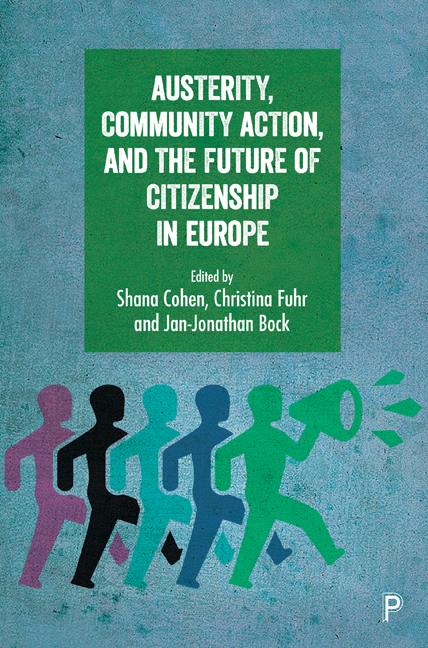Book contents
- Frontmatter
- Dedication
- Contents
- Acknowledgements
- Notes on contributors
- one Introduction: social activism, belonging and citizenship in a period of crisis
- Part I The social consequences of welfare policy
- Part II The practice of social good
- Part III Social change and neoliberalism
- Part IV Situating solidarity in perspective
- Index
Fifteen - Aiming for reconnection: responsible citizenship
Published online by Cambridge University Press: 05 April 2022
- Frontmatter
- Dedication
- Contents
- Acknowledgements
- Notes on contributors
- one Introduction: social activism, belonging and citizenship in a period of crisis
- Part I The social consequences of welfare policy
- Part II The practice of social good
- Part III Social change and neoliberalism
- Part IV Situating solidarity in perspective
- Index
Summary
At the heart of this chapter is a deceptively simple thesis – namely, that in the context of an increasingly post-secular and post-welfare/ austerity public sphere, the motivating energy of beliefs, values and attitudes (what I will later expand on as spiritual capital) comes more into the frame as a key conceptual framework for both analysing current political and citizenship trends and projecting future policy trajectories. Concrete actions in terms of volunteering and other forms of engagement (the ‘what’) have always been directly shaped and brought into being by principles, commitments and beliefs that shape our ethical orientation in the public sphere (the ‘why’).
However, for reasons of historical and philosophical development in the West, the ‘why’ in the form of individual beliefs, values and attitudes has traditionally been viewed with suspicion as a threat to a universally recognised, and therefore coherent and fair, narrative of the public sphere and its rules of engagement. For both ideological and cultural reasons, it was deemed both appropriate and desirable that when it came to organising or policing the western public sphere, the ‘what’ should be disconnected from the ‘why’; that personal beliefs (especially those of a religious nature) should be subsumed within loyalty to abstract entities and principles (such as the nation/welfare state or justice).
However, I argue that we (at least in the West) have arrived at a political, cultural and social nexus of events and trends where it is indeed no longer possible (or indeed desirable) to disconnect the ‘why’ from the ‘what’; that in terms of helping to build a vibrant, resilient, participatory (and therefore more democratic) public sphere, the motivating and energising capital of beliefs, values and attitudes needs to foregrounded and harnessed in the service of ‘what’ (after Featherstone et al, 2012) I shall call a ‘progressive localism’. Key to my proposed methodology for developing a ‘responsible citizenship’ in an era of austerity will be to look at how faith groups are modelling the generative power of spiritual capital to other forms of capital (such as social, human and economic) in a post-welfare policy landscape. We can prove that the demonstrable power of religious-based social capital can only be enhanced if one allows the ‘why’ and the ‘what ‘to be reconnected – if the spiritual is reconnected to the civic and the political.
- Type
- Chapter
- Information
- Austerity Community Action and the Future of Citizenship , pp. 255 - 276Publisher: Bristol University PressPrint publication year: 2017

